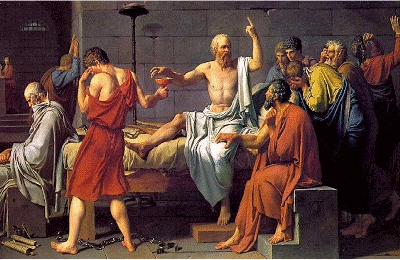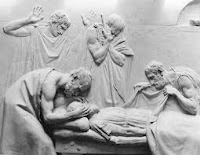 Crito is a short semi-fictional dialog written by Plato depicting the way in which the government of a city operates in relation to its citizens. Plato wrote many short pieces set as conversations of Socrates trying to express his philosophies, called Platonic Dialogs. One of the more famous ones is as Socrates is held prisoner awaiting his execution. Meanwhile, his dear friend Crito is planning to sneak him out.
Crito is a short semi-fictional dialog written by Plato depicting the way in which the government of a city operates in relation to its citizens. Plato wrote many short pieces set as conversations of Socrates trying to express his philosophies, called Platonic Dialogs. One of the more famous ones is as Socrates is held prisoner awaiting his execution. Meanwhile, his dear friend Crito is planning to sneak him out.Socrates was arrested, technically, for presenting new gods, not respecting prior ones, and corrupting the youth -- to put it more bluntly, teaching. His real crime to Athens was that some of his childhood friends had recently been removed from a terrible tyranny over Athens. In Athens at that time, it was illegal to charge people for political crimes, and since the "Tyranny of Thirty" got off, Socrates was awarded the brunt of the misplaced aggression. Though, to Athens' credit, they weren't planning to kill him. They were planning to exile him or fine him, and then move on. But Socrates had a rather spectacular reaction. In Athens, you defend yourself and suggest your own punishment, and the jury must then pick either your suggested punishment, or the prosecutions. When choosing his sentence, Socrates asked for free room and board and to be honored throughout Athens. Compared with that and death, when the jury could only pick one, they had no choice but to fall to the latter.
Strangely enough, as Crito explains his great plan for Socrates' rescue, Socrates argues him down. His opinions about the city, (at least according to Plato) lead Socrates to accept his unfair execution.
Socrates argues first that he should obey this law of Athens to protect Athens itself, asking if "a city can still exist without being overturned, if the legal judgements rendered within it posses no force" (27). Socrates believes that if he should escape his punishment, he is proving the laws of Athens have no power, and without enforceable laws, the city is doomed to crumble.
But then some would ask: Hey wait. Why does he care what happens to Athens? Aren't they about to kill him just because he used to be friends with some tyrants who got off easy? But Socrates has reasons for feeling so honor-bound to Athens. Without the city, of Athens, there'd be no Socrates. His parents were married under Athenian law, and Socrates was born in Athens. By the laws and regulations of Athens, Socrates was educated well enough to become the brilliant philosopher he was. Socrates felt he belonged to his city "as [its] offspring and slave" (28). Socrates felt indebted to his city, for raising him and housing him and teaching him to be Socrates.
Still others would say: Well still. That's a bit excessive. I don't want to be a slave to a place just because I grew up there! Socrates has a response for you too. If you don't like it, MOVE! The city of Athens gave him every right to leave at whatever time he wanted. If Socrates "wishes to emigrate to a colony, or to go and live as an alien elsewhere, he may go wherever he pleases and keep his property, if we and city fail to satisfy him" (28). Socrates could have left Athens at any time if he didn't agree with the laws, and yet he didn't. By staying in Athens, Socrates accepted any future judgement it may have for him.
What I find sort of fascin
 ating about how indebted Socrates felt to Athens is that now people would cringe
ating about how indebted Socrates felt to Athens is that now people would cringe at that concept, and yet environmental determinism results in the same sort of slavery Socrates agreed with, only unconsciously obeyed. When Jimmie feels the need to fight and blindly hate the upper class, it is because the city has shaped him. The slums of Jimmie's city, in a way order him to become what he does; without one complaint he does it. When Maggie dies, she's accepting her unjustly awarded death sentence, just as did Socrates.
at that concept, and yet environmental determinism results in the same sort of slavery Socrates agreed with, only unconsciously obeyed. When Jimmie feels the need to fight and blindly hate the upper class, it is because the city has shaped him. The slums of Jimmie's city, in a way order him to become what he does; without one complaint he does it. When Maggie dies, she's accepting her unjustly awarded death sentence, just as did Socrates.(PS, Don't fret if my quotes don't match my link for Crito. This was originally written in Greek, and some of the translations differ, it wasn't exactly the same one I found online, but it expresses the same ideas.)
Cahn, Steven M. Political Philosophy: the Essential Texts. New York: Oxford UP, 2005. Print.
No comments:
Post a Comment